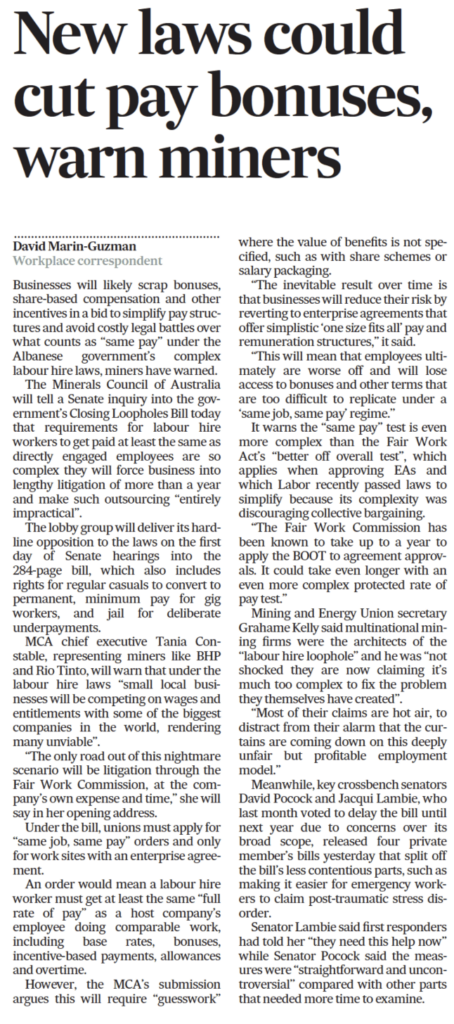
Article by David Marin-Guzman courtesy of the Australian Financial Review.

Businesses will likely scrap bonuses, share-based compensation and other incentives in a bid to simplify pay structures and avoid costly legal battles over what counts as ‘‘same pay’’ under the Albanese government’s complex labour hire laws, miners have warned.
The Minerals Council of Australia will tell a Senate inquiry into the government’s Closing Loopholes Bill today that requirements for labour hire workers to get paid at least the same as directly engaged employees are so complex they will force business into lengthy litigation of more than a year and make such outsourcing ‘‘entirely impractical’’.
The lobby group will deliver its hardline opposition to the laws on the first day of Senate hearings into the 284-page bill, which also includes rights for regular casuals to convert to permanent, minimum pay for gig workers, and jail for deliberate underpayments.
MCA chief executive Tania Constable, representing miners like BHP and Rio Tinto, will warn that under the labour hire laws ‘‘small local businesses will be competing on wages and entitlements with some of the biggest companies in the world, rendering many unviable’’.
‘‘The only road out of this nightmare scenario will be litigation through the Fair Work Commission, at the company’s own expense and time,’’ she will say in her opening address.
Under the bill, unions must apply for ‘‘same job, same pay’’ orders and only for work sites with an enterprise agreement.
An order would mean a labour hire worker must get at least the same ‘‘full rate of pay’’ as a host company’s employee doing comparable work, including base rates, bonuses, incentive-based payments, allowances and overtime.
However, the MCA’s submission argues this will require ‘‘guesswork’’ where the value of benefits is not specified, such as with share schemes or salary packaging.
‘‘The inevitable result over time is that businesses will reduce their risk by reverting to enterprise agreements that offer simplistic ‘one size fits all’ pay and remuneration structures,’’ it said.
‘‘This will mean that employees ultimately are worse off and will lose access to bonuses and other terms that are too difficult to replicate under a ‘same job, same pay’ regime.’’
It warns the ‘‘same pay’’ test is even more complex than the Fair Work Act’s ‘‘better off overall test’’, which applies when approving EAs and which Labor recently passed laws to simplify because its complexity was discouraging collective bargaining.
‘‘The Fair Work Commission has been known to take up to a year to apply the BOOT to agreement approvals. It could take even longer with an even more complex protected rate of pay test.’’
Mining and Energy Union secretary Grahame Kelly said multinational mining firms were the architects of the ‘‘labour hire loophole’’ and he was ‘‘not shocked they are now claiming it’s much too complex to fix the problem they themselves have created’’.
‘‘Most of their claims are hot air, to distract from their alarm that the curtains are coming down on this deeply unfair but profitable employment model.’’
Meanwhile, key crossbench senators David Pocock and Jacqui Lambie, who last month voted to delay the bill until next year due to concerns over its broad scope, released four private member’s bills yesterday that split off the bill’s less contentious parts, such as making it easier for emergency workers to claim post-traumatic stress disorder.
Senator Lambie said first responders had told her ‘‘they need this help now’’ while Senator Pocock said the measures were ‘‘straightforward and uncontroversial’’ compared with other parts that needed more time to examine.